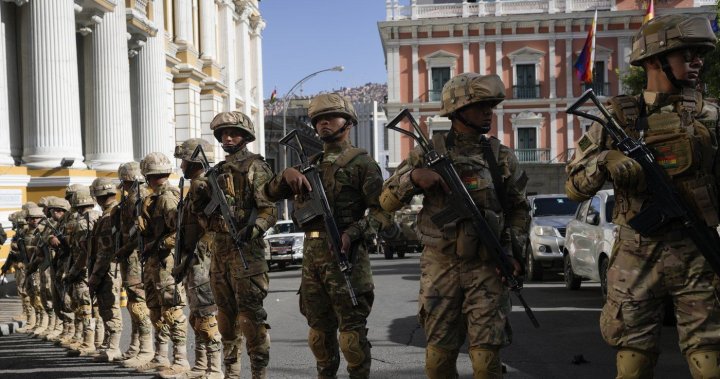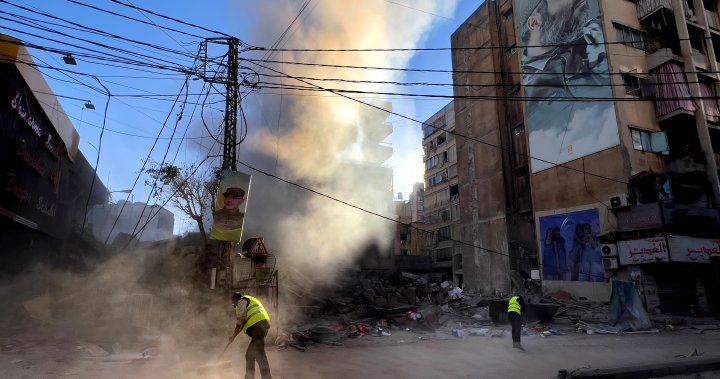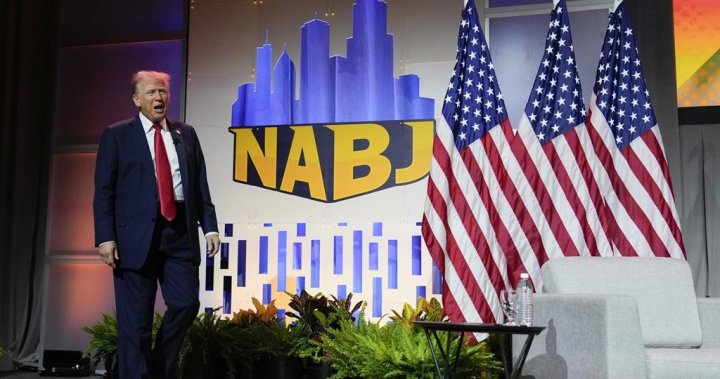Armored vehicles rammed into the doors of Bolivia’s government palace Wednesday as President Luis Arce said the country faced an attempted coup, insisted he stands firm and urged people to mobilize.
In a video of Arce surrounded by ministers in the palace, he said: “The country is facing an attempted coup d’état. Here we are, firm in Casa Grande, to confront any coup attempt. We need the Bolivian people to organize.”
Arce confronted the general commander of the Army, Juan José Zúñiga, in the palace hallway, as shown on video on Bolivian television. “I am your captain, and I order you to withdraw your soldiers, and I will not allow this insubordination,” Arce said.
Before entering the government building, Zúñiga told journalists in the plaza: “Surely soon there will be a new Cabinet of ministers; our country, our state cannot go on like this.” Zúñiga said that “for now” he recognizes Arce as commander in chief.
A soldier gestures for journalists to leave Plaza Murillo as soldiers gather near the presidential palace in Plaza Murillo in La Paz, Bolivia, Wednesday, June 26, 2024. (AP Photo/Juan Karita).
In a message on his X account, Arce called for “democracy to be respected.” It came as Bolivian television showed two tanks and a number of men in military uniform in front of the government palace.
The email you need for the day’s
top news stories from Canada and around the world.
“We cannot allow, once again, coup attempts to take the lives of Bolivians,” he said from inside the palace, surrounded by government officials, in a video message sent to news outlets.
Former President Evo Morales, also in a message on X, denounced the movement of the military in the Murillo square outside the palace, calling it a coup “in the making.”
María Nela Prada, minister of the presidency and a top Bolivian official, called it an “attempted coup d’etat.”
“The people are on alert to defend democracy,” she said to local television station Red Uno.
FILE – Bolivian President Luis Arce attends an Indigenous ritual before delivering his annual state of the nation address at the presidential palace in La Paz, Bolivia, Jan. 22, 2024. Armored vehicles rammed into the doors of Bolivia’s government palace Wednesday, June 26, 2024, as a top government official warned of a coup attempt. (AP Photo/Juan Karita, File) (AP Photo/Juan Karita, File).
JK
The incident was met with a wave of outrage by other regional leaders, including the Organization of American States; Gabriel Boric, the president of neighboring Chile; Honduras’s leader, and former Bolivian leaders.
Bolivia, a country of 12 million people, has seen intensifying protests in recent months over the economy’s precipitous decline from one of the continent’s fastest-growing two decades ago to one of its most crisis-stricken.
The country also has seen a high-profile rift at the highest levels of the governing party. Arce and his one-time ally, leftist icon and former President Morales, have been battling for the future of Bolivia’s splintering Movement for Socialism, known by its Spanish acronym MAS, ahead of elections in 2025.

© 2024 The Canadian Press





